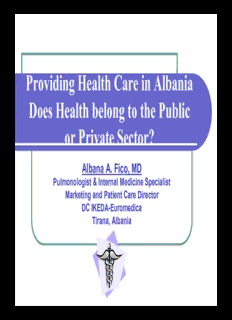
Providing Health Care in Albania Does Health belong to the Public or Private Sector? PDF
Preview Providing Health Care in Albania Does Health belong to the Public or Private Sector?
Providing Health Care in Albania Does Health belong to the Public or Private Sector? Albana A. Fico, MD Pulmonologist & Internal Medicine Specialist Marketing and Patient Care Director DC IKEDA-Euromedica Tirana, Albania TABLE OF CONTENT # Instead of a Foreword # Health definitions, factors that affect health, indicators and recent statistics for Albania # What do International partners require from Albanian Government (EU, WHO,USAID, MCC) # Health Care system, organization, specific problems Primary care and public health care Inpatient health care Pharmaceutical system and dental care Privatization Area coverage (rural and urban) Medical Personnel ( MDs and nurses ) CME( population and Medical community) Medical equipments in the framework of attempts made to modernize medicine Financing Health info systems and e-services # Conclusions # References Instead of a foreword In the attempt made to better understand the reality of the health care situation in Albania today I came across of two pictures instead of one. The first is the portrait one will find exploring the official government sites and the second the everyday reality that unfortunately Albanians have to face if in contact with the health care system either primary or secondary. In my humble opinion, I strongly believe that a single expert , no matter what his or her understanding of the phenomenon is, would not be capable of including everything in the following pages, thus reporting precisely all dimensions of this grave situation that leave Albanians unprotected in the face of the health risks. But with the same token, this provides the opportunity for a healthy, competent and scientific debate that will lead to the compilation of sound strategies with realistic, achievable goals in order to find the right paths for their implementation. The following findings are only a “Snap-shot” of the actual situation in Albania. There are things that can’t be changed overnight, but there is no justification to be a bystander! I strongly believe that private health care system should lead the way in the right direction for a qualitative physical and mental health care, characteristic of the new Millennium! We can do it! The time is today, the moment is now! Everything begins with us!!! H “ ealth is the condition of complete physical, mental and social wellbeing and not only lack of illness or disability.” WHO 1947 H ealth is a: Multidimensional concept: ¨ Expresses the individual’s attributes Expresses the society’s attributes Social concept ¨ Historic and relative concept ¨ Multi factorial concept ¨ H “… ealth is a basic human right and the responsibility of the governments…” Alma –Ata Declaration 1979 Preconditions for Good Health: “…Life in peace, a secure shelter, good education, good nutrition, enough income, a steady echo system, social justice and equality…” Ottawa Charter 1986 Factors that Influence Health: Social and economic ( poverty and inequality, n unemployment, risk factors especially those related to life style like alcohol consumption, smoking, stress etc.) Government policies ( % in ratio to GDP) n Health infrastructure n Health Indicators: The parameters that represent the level of health condition of a population and they are classified as follows: Demographic data ( % of population over 65y/old) ¨ Mortality ¨ Morbidity, disability, hospital discharge ¨ Environment ¨ Sources of Health Care ¨ Utilization of Health Care and expenditures ¨ Health of mother and child ¨ New statistics (Albania): Population : 3,172,000 n National income per capita ($): 5,840 n Lifespan at birth m/f (years):69/73 n Lifespan of a healthy life at birth m/f (years, 2003): 59/63 n Probability of death under 5 y/old (per 1 000 live births): 17 n Probability of death 15-60 years range m/f (per 1 000 people): 170/103 n $$ spent for Health per capita ($, 2005): 353 n Total amount of money spent for health as a % of GDP (2005): 6.5 n World Health Statistics 2008 What do International partners require from Albanian Government?
Description: